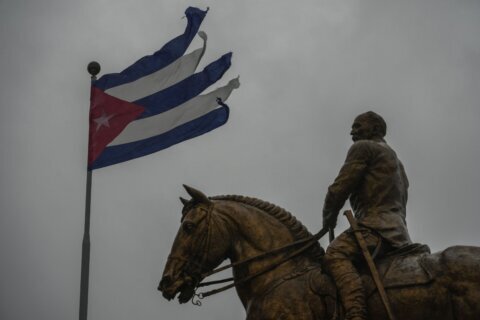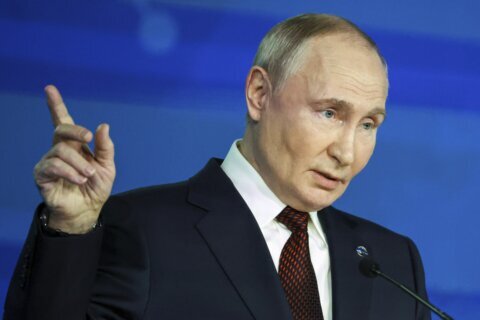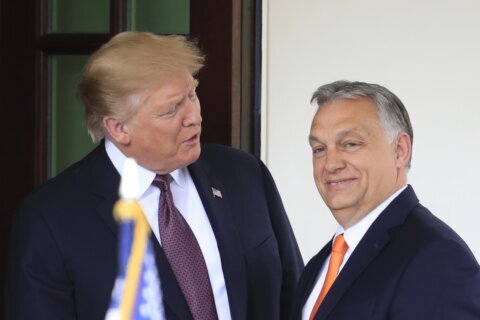JERUSALEM — Every day, thousands of Palestinians cross from the West Bank into Israel for work and medical care. And in the West Bank, Israelis and Palestinians often shop or fill up their cars with gasoline at the same places.
But as Israelis are getting vaccinated against COVID-19 at the fastest rate in the world, most Palestinians have no idea when they will get an injection, raising both ethical and practical questions as to whether Israel can tame the pandemic alone, without the Palestinians also obtaining herd immunity.
The situation, criticized at a United Nations meeting this week, offers a microcosm of the effects of so-called vaccine nationalism, or what happens when developed countries prioritize only their own citizens.
“The COVID-19 challenges can only be addressed collectively and in solidarity,” said Gerald Rockenschaub, head of the World Health Organization’s office for the West Bank and Gaza.
“The World Health Organization remains concerned about the inequities in the distribution of COVID-19 vaccines globally, especially to low- and middle-income countries. The differences between Israel and Palestine reflect this global imbalance and highlight the need for international cooperation to ensure effective vaccine coverage in an interconnected world.”
After striking an agreement with vaccine maker Pfizer to share health data in return for the expedited arrival of millions of purchased shots, Israel has already administered the first of the two-shot regimen to about 2.7 million people, or about one-third of its population. About 1.3 million people have received both doses, given three weeks apart, according to the Israel Ministry of Health.
[MORE: African Health Official Blasts ‘Terrible’ Vaccine Inequality]
Meanwhile, Palestinian health officials haven’t yet launched a vaccine campaign for the approximately 5 million people who live in the West Bank and Gaza, and are still awaiting shipments of shots they ordered from pharmaceutical companies, as well as subsidized vaccines from the Gavi COVAX Advanced Market Committment, an initiative to provide vaccines to low-income countries. But none of these vaccines are expected to arrive before next month, and most will only arrive later in the year, and likely not covering the entire population.
Some Palestinian and international officials have criticized Israel for not providing vaccines to the Palestinians who live in the West Bank and Gaza, areas that Israel conquered from Jordan in the 1967 Six Day War.
“The occupying power has not provided any vaccines to the Palestinian people under occupation to this day, insisting it is under no obligation to do so,” Palestinian minister of foreign affairs Riad Malki said on Tuesday at a meeting of the U.N. Security Council.
At the same meeting, Tor Wennesland, the U.N.’s Special Coordinator for the Middle East Peace Process, noted that Israel has been helping to supply the Palestinians with personal protective equipment, oxygen therapy machines and other needs during the pandemic, and should step up its efforts to also provide vaccinations.
“The U.N. continues to encourage Israel to help address the priority needs of Palestinians in the occupied Palestinian territories, and to support COVID-19 vaccine availability more generally,” Wennesland said. “This will be critical for the broader efforts of both governments to control the pandemic and is also in line with Israel’s obligations under international law.”
But Israel’s ambassador to the United Nations, Gilad Erdan, said on Twitter that international agreements make the Palestinian Authority responsible for its citizens’ health care. He added that Israel will facilitate the transfer of vaccines that the Palestinians order from abroad. Israel’s health minister has said Israel is focusing only on its citizens because they are the ones paying taxes that support the country’s health care system.
[MORE: Countries Seen to Have Well-Developed Public Health Care Systems]
International and Israeli medical professionals and human rights groups have also called on Israel, which treats thousands of Palestinian patients in its hospitals each year, to also provide vaccinations. Even some Israeli government officials have said the country should help, but that has yet to happen.
“As a physician I think it is important to see that our neighbors are vaccinated,” says Boaz Lev, a physician who heads the advisory board for epidemic control and vaccination at the Israel Ministry of Health. “And Israel should be part of this effort.”
Some Palestinians, including many of those who by living in East Jerusalem have Israeli medical insurance, and those who work at some Jerusalem hospitals, have received vaccinations, provided by the Israel Ministry of Health.
Israel has also said it would offer vaccines to Palestinians held in its military prisons.
But most Palestinians, including the approximately 65,000 who work in Israel’s construction sector, remain unvaccinated. The Israeli Builders Association has requested that the Israeli government offer these workers vaccines, but the matter has not been solved.
“We depend on them, and they depend on us,” says Shay Pauzner, deputy director general of the Israeli Builders Association. “We have worked with them shoulder to shoulder for a very long time. If nothing changes, and Israelis are vaccinated but the Palestinians are not, this will be a very big problem. Everything is connected because people move around and interact.”
In addition to the obvious health concerns, as virus cases rise among both Palestinians and Israelis, Palestinians also worry that a lack of vaccines will slow their ability to open up their economy, especially for tourism. The coronavirus pandemic has pushed the rate of poverty among Palestinians to 27.5%, according to the World Bank.
“The local community needs to be vaccinated, tourists will not come here otherwise, this will be a red zone,” says Issa Albaabish, a resident of the Palestinian city of Bethlehem, who lost his job with a tourism agency when the pandemic hit. “And I am worried that will take a very long time because generally the health sector is weak in Palestine. I think the Israeli government has a duty to help, as they govern this region, and has the duty to vaccinate the people here.”
More from U.S. News
Coronavirus Pandemic Boosting Anti-Virus Research Around the World
Commentary: Tackling Inequalities in Healthcare Worldwide
The Top 10 Global Risks for 2021
Plight of Palestinians Reflects Global Vaccination Inequity, U.N. Says originally appeared on usnews.com







